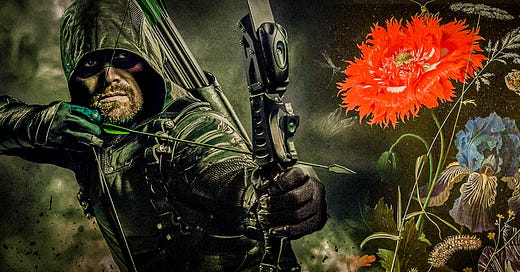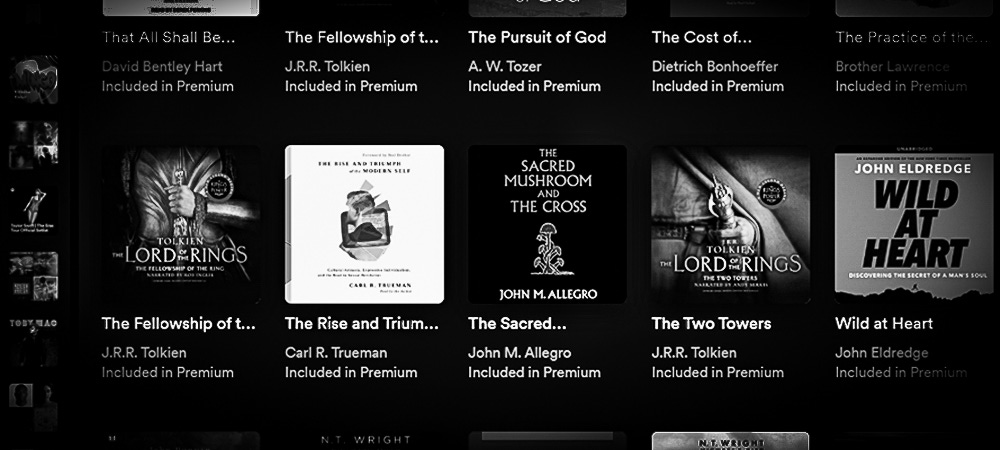supporting the art you want to see in the world
Not the usual stuff I talk about, but this is important
I used to hate commercials. Especially back when I was heavily invested in The CW’s budding Arrowverse, the interconnected series of television shows developed from DC characters like Green Arrow, The Flash, Constantine, etc. I’d log on to The CW’s clunky on-demand video platform the day after an episode aired and quickly become frustrated by the frequent (and lengthy) commercial breaks. (I don’t think there was an ad-free subscription option back then; if there was, I didn’t have money to spare.)
My rage against the ad machine mollified as I grew familiar with the actors, producers, showrunners, and screenwriters working hard to bring the Arrowverse to life. Cameramen, set designers, CGI artists, and costume and makeup technicians develop imaginative worlds for others to abide in, and they deserve fair compensation. While I haven’t kept up with the Arrowverse in years, I don’t mind commercials so much anymore—they’re necessary. And I also have money to pay for ad-free subscriptions now.
I bring that up because the current events, entertainment, and information/edification industries are in dramatic flux. They’re being simultaneously fractured and consolidated at neck-breaking speed. And it’s more important now that we, as consumers, as audiences, pay attention to where our money is going and be deliberate about the artists and creative endeavors we support.
Here are some definitions…
Current events industry refers generally to news delivery via print, television, internet, and radio mediums.
Entertainment industry refers to movies, television, books, music, theatre, etc.
Information/edification industry refers to the commentator class, independent writers, bloggers, substackers, podcasters—all those people trying to explain the world or just talking about what they like.
How are these industries being both fractured and consolidated?
The current events industry is fracturing, breaking into smaller audiences attending to ever more narrowly-defined voices. It’s hard to imagine going back to the days when everyone tuned into the same news shows or read the same syndicated articles in their daily papers. Only a tiny segment of the population watches “the evening news” now. The rest get their information from X or Reddit or TikTok or specialty news sites that appeal to specialty audiences.
The entertainment industry is undergoing fracturing and consolidation at the same time, depending on which way you look at it. Sure, now, it’s easier than ever for anyone with a slight amount of cash and a moderate measure of will to publish a book, make a film, or produce an album. Still, monopolizing influences play a dominating factor. Spotify, an app/company for which I have no hate, is a case in point.
Spotify launched its music application in Sweden in 2006 and expanded to international markets within four years. Within nine years it began offering podcasts in addition to music. Its history as a podcasting service is a history of taking over other podcasting services—Gimlet Media, Anchor FM, Parcast, Megaphone, Whooshkaa. One by one, they fell to the power of the ring, etc. The company also cut exclusive deals with massively popular podcasters like Joe Budden and Joe Rogan, delivering unto itself not only industry architecture but huge audiences to boot. Now, it seems Spotify wants to do the same with audiobooks. Late last year, it made 200,000 audiobooks available to its existing subscriber base (at no extra cost). I suppose it’s only a matter of time before it starts buying out audiobook companies and cutting deals with bestselling authors and voice actors.
I can’t say all of that is explicitly bad. (When you cut it, a moral argument can and should be made.) Corporations are gonna do what corporations do—expand, grow, try to capture more market share, and increase profits with as little investment as possible. We see it all over. Amazon sells almost everything now and felt it needed to own the television rights to Lord of the Rings. This would be like if Walmart—Asda for you Brits—announced it’s producing the next Star Wars movie. As vexing as that is, I can’t say that if I were sitting in Amazon’s C-suite, I’d make different decisions. (I mean, I do feel I could make a better LOTR streaming series than Rings of Power.)
So, yeah, entertainment industries are weird and vexing right now. There’s storied history of independent artists sticking to their own way and eventually making it big. But for every indy singer, author, filmmaker, etc., who you’ve heard of, there are a hundred more throwing paint at the wall and working a day job hoping for a big break. At least, now, almost everyone has access to the tools to create at will.
Then there’s the information-edification industry, comprised of all the content meant to explain the world or improve one’s life or society. It’s what I’m doing on this substack and what most substacks are doing. It’s the social media and lifestyle influencers. It’s the explainer videos and how-to experts. It’s Wikipedia. It’s the industry of people creating and selling “content” (mostly online) to engage people mentally, psychologically, spiritually—to help, to explain things, or just talk about shared interests. There’s hardly any consolidation happening in this industry. It’s the Wild West.
Support for an end-product in any of these industries doesn’t flow downstream the way it used to—and hasn’t for a long time. The people creating the thing, in both fractured and consolidated environments, don’t always get adequate attention or money for the thing they create. The Nashville Songwriters Association International recently pointed out that Spotify bundling music and audiobooks in the same subscription scheme would result in a loss of $150 million for songwriters. Sure, it’s a win-win for Spotify, but it’s a loss for writers, publishers, singers, songwriters, etc. You can’t already be offering access to thousands of albums for $12/month and then be like here’s 250,000 audiobooks for free.
That’s an extreme example, but one of many that have caused me to think more about where my money goes in these industries. In a world of paywalls and extremely annoying internet ads, I subscribe directly to current events publications I consider fair, interesting, and ethical. I subscribe to a handful of magazines and substacks which I regularly read and enjoy. It makes me happy knowing my money goes directly to a person or group of people who are adding value to my life and the life of the world—and there’s no middlemen taking cuts. Additionally, I support three organizations that invest in and develop artists and creators.
Yes, I still have my Disney+ and Hulu subscriptions. (Disney recently devoured Hulu to the tune of $8.6 billion. How’s that for consolidation?) How else am I gonna finish rewatching 12 Monkeys and watch The Acolyte when it comes out? But now, more than ever, we must be wary of how fracturing and consolidating influences are affecting the arts and how that has a direct impact on the livelihood of artists (whether of the current events, entertainment, or information/edification variety). We must consider the art and artists we want impacting the world and, as much as possible, seed the ground with our energy and money.
asides + signal boosts
“Mind your own business—and have a lot of your own business to mind.” This advice from Flannery O’Connor jumped out as I listened to The Terrible Speed of Mercy, a spiritual biography of her by Jonathan Rogers. (It’s an excellent audiobook and, no, I didn’t listen via Spotify.) But this makes me feel an even stronger affinity for Flannery, because I have a lot of business to mind and I like it that way. Life is meant to be spent!
I’ve been making my way through the previously mentioned 12 Monkeys. It’s just as good as I remember from watching it years ago, except I don’t remember a lot of it so it’s like watching for the first time. My abiding itch for time travel is getting a good scratch. Highly recommend!
This just came across my desk…
is giving a talk Friday at L’Abri titled King Arthur and the Dangerous Dream of Christendom. (How can the legend of Arthur help us think about the tension between the two cities, the city of man and city of God?) It’ll be published on afterward, but will be streamed live on Zoom. I’m looking forward to it!







Your abiding support for your friends is just amazing! Keep both that and the good work up!
Thanks for the mention Daniel!